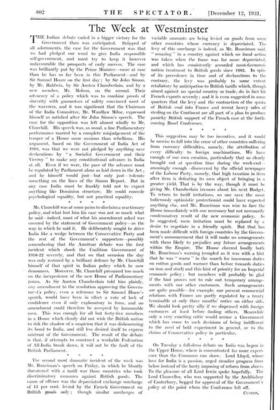Mr. Churchill was at some pains to disclaim a reactionary
policy, and what lost him his case was not so much what he said—indeed, most of what his amendment asked was covered by the statement of Government policy—as the way in which he said it. He deliberately sought to drive India like a wedge between the Conservative Party and the rest of the Government's supporters—possibly remembering that the Amritsar debate was the first incident which shook the Coalition Government of 1918-22 severely, and that on that occasion the day was only restored by a brilliant defence by Mr. Churchill himself of that spirit in Indian policy which he now denounces. Moreover, Mr. Churchill presumed too much on the inexperience of the new House of Parliamentary forms. As Sir Austen Chamberlain told him plainly, any amendment to the resolution approving the Govern- ineut's policy; even a reference to Sir Samuel Hoare's speech, would have been in effect a vote of lack of confidence even if only explanatory in form, and no amendment could therefore be accepted by honourable men. This was enough for all but forty-five members in a House which clearly did not wish the British nation to risk the shadow of a suspicion that it was dishonouring its bond to India, and still less desired itself to express mistrust of the Government. The result of the debate is that, if attempts to construct a workable Federation of All-India break down, it will not be the fault of the British Parliament.










































 Previous page
Previous page